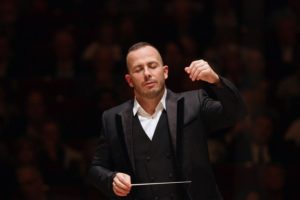
The highwater mark for Wagner at the Metropolitan Opera in recent decades was the 2013 Parsifal, handsomely directed and strongly cast. The crucial ingredient, however, was Daniele Gatti’s leadership in the pit.
The Francois Girard’s production has now returned, led by Yannick Nezet-Seguin. As he is the company’s new music director, comparisons to Gatti are inescapable.
The Nezet-Seguin Parsifal, alas, is slack and shapeless during the opera’s long outer acts. All the virtues of Gatti’s reading – the tensile line, the depth of tone, the moment-to-moment creative investment in the drama – are missing.
Amfortas’s first act monologue, heretofore a revelation, fails to build though the singer is the same. His elevation of the grail – invested by the composer with miracles of shimmering color and texture – is inadequately prepared or supported. The brisk tempo for the ensuing chorus comes out of nowhere. The act’s closing measures, in which the orchestra must move swiftly from aching pathos to consternation to beatitude, sounds like a first try, not a finished product.
With the sound of Gatti’s act three prelude fresh in the ear – he just performed it at Carnegie Hall with his Royal Concertgebouw Orchestra – Nezet-Seguin’s rendition sounded glibly dramatic; Wagner’s intended malaise of body and spirit, conveyed by Gatti with heaving oceanic accents, was wholly absent. The Good Friday music lacked an arc. The sustained sub-current of high feeling that wonderfully anchors this particular opera, governing its mood and trajectory, remained undetectable. The long evening felt rudderless. Hollow.
Act two was much better. “This fellow needs action,” said my wife – a plausible inference. Here a wide play of tempo – including a daringly prolonged silence after Kundry’s expostulation “lachte!” – aligned with the events at hand. Evelyn Herlitzius, possessor of a monochromatic soprano of good size, vividly projected the vicissitudes of Kundry’s attempted seduction.
I wish I could be more positive about the conscientiously crafted Parsifal of Klaus Florian Vogt. He nowadays also sings Tannhauser, Lohengrin, and Walther von Stolzing in the world’s major houses – but with an instrument unlike any Wagner tenor I have previousy encountered: clear and piercing, with a vinegar timbre. Its tight focus insures audibility. The words are distinctly conveyed. But absent heft and tonal beauty, every big moment, lyric or dramatic, is squandered. My first Met Parsifal, in 1966, was Sandor Konya – today not even a name. In act two, he fell to his knees, opened his arms, and poured it on: “Erloser! Rette mich!” Thirteen years after that we had Jon Vickers: prodigious. Never since, to my knowledge, has this role been cast in New York with a voice of sufficient size.
Rene Pape and Peter Mattei repeat their assignments of five seasons ago. Pape has long and deservedly owned Gurnemanz – but the luster and stamina of his bass are now fading. Mattei’s big set pieces suffer from insufficient shaping in the pit. And, sitting in the Family Circle, I missed the revelatory facial and gestural detail he presumably still brings to Amfortas.
As it happens, for the first time in over forty years I was denied tickets by the Met press office. Whether this had anything to do with my recent posting about James Levine I have no idea. Certainly I have written more about Wagner at the Met than any other living human being. No matter, my $37 seat in row H was a bargain: the sound upstairs is superb, better than downstairs up front.
Girard’s production looks handsome from afar – but I find that I no longer tolerate his dramatization of the act one and three Preludes, or the superfluity of so many women onstage during act one. What he’s driving at is sufficiently conveyed when Kundry, rather than Parsifal, first lifts the cup at the close. I still find this interpolation exceptionally moving.
The performance (I attended Saturday night) ignited a lusty ovation that peaked when Nezet-Seguin took the stage – and suddenly ended. A response to received opinion.
Our new music director is not yet 45 year old. Whether he grows into the big Wagner works remains to be seen. But I fear that, with the disappearance of Levine, a new cult may already be upon us. Please, Tony Tommasini – not so fast.

It’s possible the Met press office didn’t have many (if any) press tickets available for the Saturday night performance. Especially for a very long piece like Parsifal there is always a greater demand for tickets to performances that don’t fall immediately before a work day.
But at any rate, you should contact the press office for clarification. After you’ve straightened that out, surely Norman Lebrecht will post a correction on Slipped Disc. (Oh, stop me! I can’t help making such an obvious joke!)
I was at Saturday’s opera on February 17 and not surprisingly it was snowing inside the hall or to put it another way, the opera was a real SNOWJOB! I am thoroughly convinced that Parsifal is a CATHARTIC work of art which should bring out Subconscious emotions to the fore. No such event occurred to me during Saturdays performance. Rather a very poor mundane performance. Insulting, is there no SHAME?